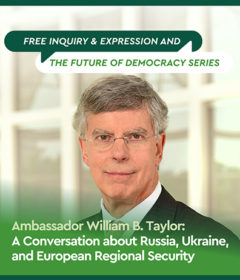Free Inquiry & Expression and the Future of Democracy Series Continues Feb. 4 with ‘A Panel on Institutional Neutrality’
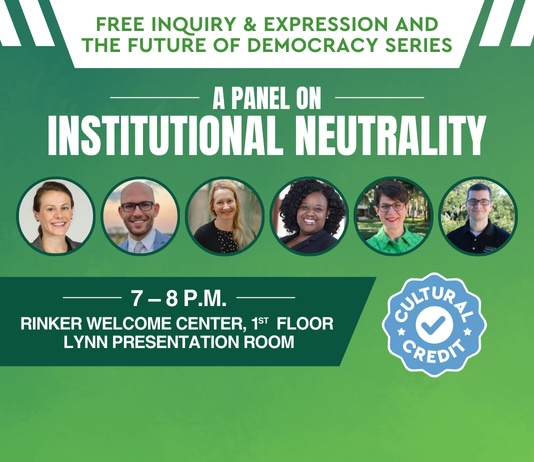
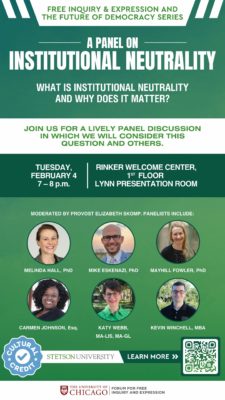
“What does institutional neutrality really look like, and is it a potential way for institutions to better serve a greater diversity of students and communities across persisting divides?”
Carmen B. Johnson, Esq., Stetson’s executive officer for Institutional Inclusive Excellence, asked the question in anticipation of a special discussion titled “A Panel on Institutional Neutrality,” set for Tuesday, Feb. 4, 7-8 p.m., at the Rinker Welcome Center’s Lynn Presentation Room.
The event is part of the university’s continuing Free Inquiry & Expression and the Future of Democracy Series, exploring timely and pressing topics throughout the spring semester. The events are open to all students, faculty and staff. Students attending the events receive Cultural Credit. (See below for a full list of remaining events.)
To date, the series has included a Presidential Inauguration watch party, “Things We Don’t Talk About at Dinner: Race Edition” and Jan. 30’s “Debating American Global Leadership.”
On Feb. 4, Johnson will be joined by Associate Dean Melinda Hall, PhD; professors Mike Eskenazi, PhD, and Mayhill Fowler, PhD; Dean of the duPont-Ball Library Katy Webb, and Center for Community Engagement Director Kevin Winchell. Provost Elizabeth Skomp, PhD, will moderate the panel discussion, which is supported in part by the University of Chicago’s Forum for Free Inquiry and Expression.
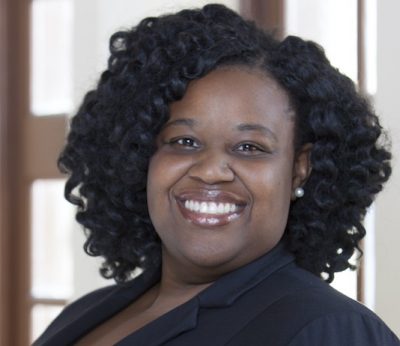
The concept of whether an institution should or should not take a stand on contemporary societal and political issues was first formally explored in the Kalven Report — the initial document that set out principles of institutional neutrality — produced in 1967 at the University of Chicago. The report’s central conclusion was that neutrality is necessary to maintain a university’s fidelity to its core mission: “the discovery, improvement and dissemination of knowledge.”
Following brief opening remarks, the panel will engage in a broadly ranging discussion of institutional neutrality.
“We are in a unique time in higher education with both external and internal conversations about how to best carry out our educational missions in an increasingly global and sociopolitical environment,” Johnson explained. ” … This is not only a timely conversation, but one that is nuanced with a wealth of perspectives to consider along with other human factors.”
Among those perspectives, for example, is the role of libraries.
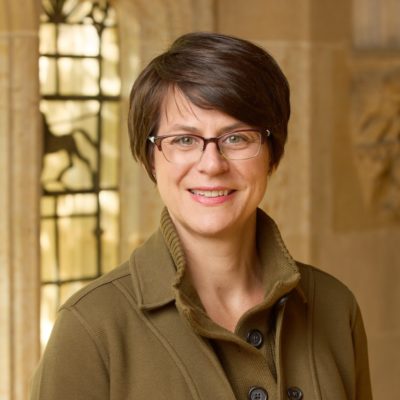
“Why would the library be interested in institutional neutrality, you might be wondering? Libraries have a long history of supporting and bolstering intellectual freedom worldwide,” Webb said. “In the U.S., the Library Bill of Rights has been adopted by the American Library Association, and it reveals basic guiding principles for libraries. Libraries are charged in this document with challenging censorship and the removal of materials, either by partisan politics, religious belief, or personal belief.
“Bringing it back to institutional neutrality, not only should the library itself endeavor to be neutral, but when a library exists at an institution that has made a commitment to institutional neutrality, this creates fertile ground for interesting new research and open dialog to occur.”
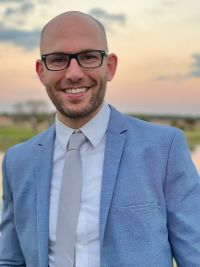
Eskenazi acknowledged the panel will focus on an “important, contentious, and often-misunderstood concept.” However, he added, “We will not necessarily attempt to persuade the audience to share our view, but rather we will have a more intellectual discussion on the concept itself. The audience can expect to gain a deeper understanding of institutional neutrality so that they can form their own views on it.”
Free Inquiry & Expression and the Future of Democracy Series
A Panel on Institutional Neutrality
Tuesday, Feb. 4
7-8 p.m.
Rinker Welcome Center, Lynn Presentation Room
Annual Patrick L. Smith Model United States Senate
March 20-22
CUB, Warren and Barbara Carr Stetson Room
Sponsored by the Stetson Political Science Department, this annual event invites students from Stetson and other institutions to portray actual U.S. Senators and learn how one of the most important democratic institutions, the United States Senate, works. The Model Senate is a true democracy in action program spread over several days. Registration is required to participate. Learn more and register at www.stetson.edu/model-senate.
Things We Don’t Talk About at Dinner: Religion Edition
Thursday, March 27
5:30-7 p.m.
CUB, Lee’s Garage
As part of another ongoing Stetson series to promote open and civil dialogue on a variety of difficult topics, this event centers on religion in the United States. With increasing numbers of college students departing from organized religion, this discussion welcomes people of all faith backgrounds — including those of no faith — to explore questions about how we do (or don’t) come to faith in a curious and judgment-free setting. Expect thought-provoking questions, small-group discussions and food (catered by Moe’s).
Promoting Democratic Values in the United States and Abroad
Date and Location TBD
6-7 p.m.
Sponsored by the Alexander Hamilton Society, this event will feature Ambassador Kelley Currie, currently a Senior Fellow at the Atlantic Council, with a joint affiliation to the Scowcroft Center for Strategy and Security and the Freedom and Prosperity Center. Currie is a founding partner of Kilo Alpha Strategies, a boutique geopolitical advisory firm, and serves on the board of directors of the National Endowment for Democracy and the advisory boards of Spirit of America, the Vandenberg Coalition and the Global Taiwan Institute.
See the Free Inquiry & Expression and the Future of Democracy Series website.


